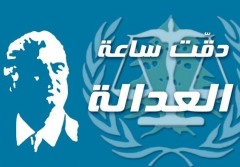 A U.N.-backed Special Tribunal for Lebanon ( STL) set up to try suspects in the 2005 assassination of Lebanese statesman Rafik al-Hariri on Thursday rejected charges by Lebanon’s Hezbollah armed group that its work is politically motivated.
A U.N.-backed Special Tribunal for Lebanon ( STL) set up to try suspects in the 2005 assassination of Lebanese statesman Rafik al-Hariri on Thursday rejected charges by Lebanon’s Hezbollah armed group that its work is politically motivated.
“Experience of other international tribunals has shown that the results of the work of such institutions speak for themselves and contradict the unsubstantiated allegations of hostile interference,” Fatima Issawi, spokeswoman for the tribunal, told Reuters in written answers to emailed questions.
“We are convinced that this will also happen in the case of the Special Tribunal for Lebanon (STL).”
Saudi Arabia’s King Abdullah and Syrian President Bashar al-Assad are due to pay an unprecedented joint visit to Beirut on Friday to try to calm a political storm over the tribunal.
This month Hezbollah leader Sayyed Hassan Nasrallah assailed the court, which is based in The Hague, as an “Israeli project” after saying he had received word that it planned to indict members of his group in connection with Hariri’s killing.
He denied that any Hezbollah members were involved. Early reports by U.N. investigators implicated Syrian and Lebanese security agencies. Syria says it had no hand in the February 14 seafront bombing in Beirut that killed Hariri and 22 others.
The assassination provoked an international furor led by the United States, France and Saudi Arabia that prompted Syria to end its 29-year military presence in Lebanon in April 2005 and led to the establishment of the special tribunal.
Asked about future indictments, Issawi said: “It would be quite unhelpful to add to the existing speculations. The Office of the Prosecutor will issue an indictment when it is ready.”
The tribunal has indicted no one since it was set up by the U.N. Security Council in May 2007. Last year it ordered the release of four pro-Syrian Lebanese generals jailed for four years without charge. Lebanese authorities had detained them at the request of a former U.N. investigator in 2005.
ROGUE ELEMENTS?
Nasrallah said Prime Minister Saad al-Hariri, son of the slain former premier, had told him the indictments of “rogue” Hezbollah members were pending. Hariri has not confirmed this.
Asked what would happen if Hezbollah or the Lebanese government, which includes Hezbollah ministers, refused to hand over indicted suspects, Issawi said the Beirut government had an obligation to respond to the tribunal’s requests.
As part of the government, Hezbollah in principle supports the tribunal, but Nasrallah said last week he did not accept that even “half of a Hezbollah member” should be indicted.
The tribunal’s rules allow for trials in absentia.
“Though we certainly hope it would not come to that, the absence of an accused will not prevent the tribunal from conducting proceedings and examining evidence against those who may be indicted,” Issawi said.
Hezbollah, a Shi’ite guerrilla movement and a powerful player in Lebanese politics, has often questioned the tribunal’s integrity and neutrality, saying its work had been tainted by false witnesses and reliance on telephone records that Israeli spies arrested in Lebanon could have manipulated.
Asked if such allegations had damaged the tribunal’s credibility, effectiveness and future funding, Issawi said: “The final results of STL’s work, rather than unfounded allegations or speculation, can be the only basis for assessing its effectiveness.”
Issawi said the tribunal was now drafting its budget proposal for next year for its management committee to consider in the autumn. “So far there has been no indication that funding will be reduced in any way.”
Lebanon provides 49 percent of the tribunal’s funding. The rest comes from voluntary contributions from states, including Saudi Arabia and Western governments. Diplomats say some Western countries are concerned about the performance of the tribunal. Reuters

Leave a Reply
You must be logged in to post a comment.